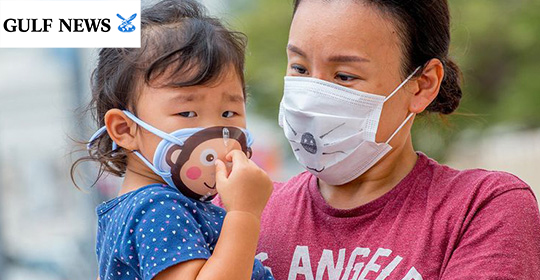Change your face mask every 2 hours to avoid infections, say Dubai doctors
Contaminated masks can lead to respiratory infections, skin rashes, say doctors
Dubai: While face masks have been acknowledged by the Centre of Disease Control (CDC) and the World Health Organisation (WHO) as the best line of defence against COVID-19 until the search for an effective vaccine, all health professionals caution that one must change masks frequently to avoid acne and infections.
According to doctors, when we wear a mask for a long period of time, it traps the spit and moisture from our respiration and despite the best oral hygiene, the microbes from our mouth get trapped between the mask and the facial skin, exposing us to many infections. It is not just COVID-19 infection from others that we need to protect ourselves from, it’s also the microbes building up on the surface of the water-resistant three-ply fabric and our skin.
 Dr Atul Aundhekar, CEO of Avivo Health Care Group that runs several health clinics under its aegis, told Gulf News: “It is recommended that people use disposable three-ply face masks that can be changed every two hours to prevent many infections. Germs and microbes are present both on the internal part of the mask as well as on the outside surface and within hours, one can expect a build-up.
Dr Atul Aundhekar, CEO of Avivo Health Care Group that runs several health clinics under its aegis, told Gulf News: “It is recommended that people use disposable three-ply face masks that can be changed every two hours to prevent many infections. Germs and microbes are present both on the internal part of the mask as well as on the outside surface and within hours, one can expect a build-up.
Dr Aundhekar said in the management of infections, one of the most effective tools to assess the microbe load is measuring the indoor or outdoor air for Virus Like Particles (VLP) and Bacterium Like Particles (BLP).
“One can similarly measure the colony of bacteria that build up per square section of a fabric. Tests have revealed that in one hour, the build-up is 1×10 raised to the power of 5. This means in a couple of hours, one can have a build-up of millions of microbes which then can mutate with interaction of the environmental growth factors causing infections. One can get respiratory tract infections as well as face rashes with prolonged use of mask without changing,” cautioned Dr Aundhekar.
How are surgical masks made?
Surgical face masks are made up of a multilayered structure, generally by covering a layer of textile with non-woven bonded fabric on both sides which has better bacteria filtration and air permeability while remaining less slippery than woven cloth. The material most commonly used to make them is polypropylene, either 20 or 25 grams per square meter (gsm) in density. Masks can also be made of polystyrene, polycarbonate, polyethylene or polyester.
 Typically, people who do not change their masks can suffer from acne, skin rashes and respiratory infections such as runny noses from the impact of this microbial build up, says Dr Sarah Agha, GP for Aesthetic Dermatology at Aesthetica Clinic in Dubai Health Care City (DHCC).
Typically, people who do not change their masks can suffer from acne, skin rashes and respiratory infections such as runny noses from the impact of this microbial build up, says Dr Sarah Agha, GP for Aesthetic Dermatology at Aesthetica Clinic in Dubai Health Care City (DHCC).
Dr Agha reported a rise in facial acne cases in her practice. “The normal three-ply face masks we use have three layers of non-woven fabric which is water resistant to prevent outside microbes entering the mouth. But these layers use polypropylene which is like a chemical coating on the fabric which can cause face allergy and acne with long use. The fabric rubs against the skin for a long time. The microbes from our mouth are exhaled when we speak with the mask on. These mixed with droplets line the inner layers of the fabric as they are trapped. This causes a build-up of bacteria. Despite the best oral hygiene the microbes from out mouth with a build-up mix with the humidity from the air clog the sweat pores causing infection. Those who use face masks for prolonged hours are most susceptible to skin rashes and infections. Especially people who have oily skin. The pores get inflamed with infection resulting in rash and acne. Therefore, I advise people to change their mask every two hours as it becomes damp, soiled and coated with microorganisms,” explained Dr Sarah.







